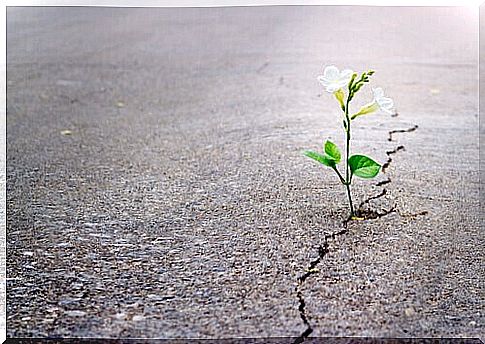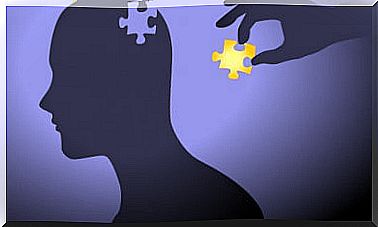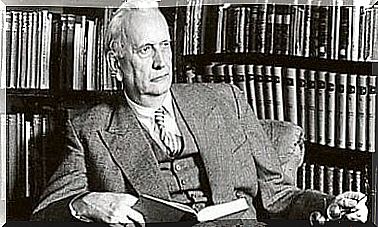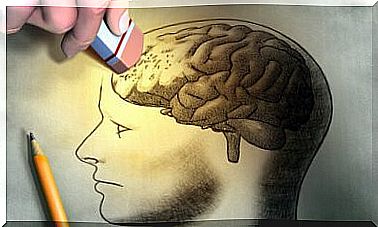5 Steps To Overcome A Traumatic Memory

Overcoming a traumatic memory is, in most cases, a difficult task that must be faced before it harms people throughout their lives and changes their personality and way of being.
Trauma is defined as a psychic injury suffered by people as a consequence of a negative event in their life, which affects them dramatically, causing them pain and emotional anguish.
We cannot change the past, that experience that caused us so much pain (the death of a loved one, a complex relationship or having suffered abuse in childhood) is part of our existence and, sometimes, has great value as an experience educational vital, even if we are not aware of it:
Resilience: the evolution of traumatic memory
It is curious how in the face of a traumatic experience there are people who come out reinforced. Traumas and our weaknesses can be transformed into a positive practice as long as we are able to integrate them into our lives and adapt.

Extracting a positive experience from a traumatic event does not depend only on the capacity of a person but on the achievement of events in which several people and elements intervene to get out of that situation strengthened and, therefore, learn from it.
A clear example of resilience is the story that the Álvarez Belón family lived in December 2004. That day, María and Enrique enjoyed their Christmas holidays in Thailand with their three children.
When the tsunami wave hit, his personal experiences changed forever. Today, many years after that tragedy that took tens of thousands of lives on the shores of the Pacific, the life of the family passes with absolute normality, living with the change that the strong impact of the event produced on them.
Memory blocking as a defense mechanism
Our memory works selectively with the memories it holds and in traumatic situations; that is to say, in these cases our memory activates a defense mechanism to ignore the past and be able to continue forward.
This defense mechanism, in an effort to protect ourselves from traumatic situations experienced, blocks negative memories to avoid the suffering of having to relive those moments. Amnesia acts as a protective shield against what we cannot assimilate due to the pain it causes us.
It is common to avoid the thoughts associated with the traumatic memory and even avoid those situations, activities, objects or people that lead us to remember what happened. However, the situation of not remembering these traumatic situations does not eliminate the negative effect that those events caused us. Pain, grief, fear or anger are still present.
How to get over a traumatic memory
Trust those around you
Try to surround yourself with people who listen and support you. Talk about what happens to you, express your feelings about the memories that haunt you and prevent you from enjoying life. Trusted people will support you and empathize with you.
It can happen that sometimes the trauma is the result of what was perceived and not really of what happened. For example, that a person during their childhood felt rejected or unloved, but this does not mean that it was indeed like that. However, having lived it as if it were, you will suffer all the consequences that derive from an emotional trauma.
Take your time to recover
After any traumatic event there is always a recovery process until we emotionally redeem ourselves again. If you have had such a negative experience, your body and mind will be affected. This situation entails changes on a physical and behavioral level and in the way you face your life from that moment on.
The completion of the recovery process will depend on each person, it is difficult to set a limit, since we are talking about emotions. A key moment is considered to be one in which we are able to look back at the past and remember what happened without intense pain.

Seek professional help
On certain occasions the cause of the trauma is not clear. The main thing in this case, is to discover it to understand the reason for the problem and from there to put a solution. It is advisable to go to a professional so that through therapeutic work the origin of this emotional chaos can be found.
Take time
Try to redirect your life reflecting on how you are going to face the future. Look for support groups in which similar experiences are discussed to express your doubts, fears and emotions, in a welcoming environment where they will understand you.
Resume your social life, meet your group of friends. The important thing is that you stay active. Going to a course or meeting center will serve as a distraction and increase your self-esteem. Get physical exercise. Strength, flexibility and balance are the three pillars on which our health is built, especially when the traumatic memory grips us.
Give a meaning to your life
If you are looking for a meaning in your life, your personal assessment will increase and you will find a justification for your actions. You will prevent anguish from undermining your mood and, apart from enhancing your resilience, you will prevent the traumatic memory from invading your day to day.
Viktor Frankl said that the search for the meaning of life is the essence of our existence. That our happiness depends on the attitude of explorers with which we move around the world.









